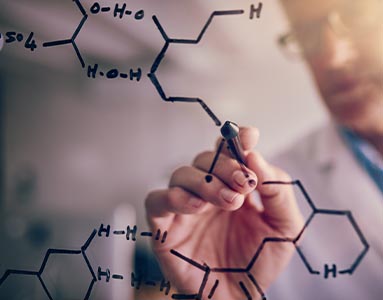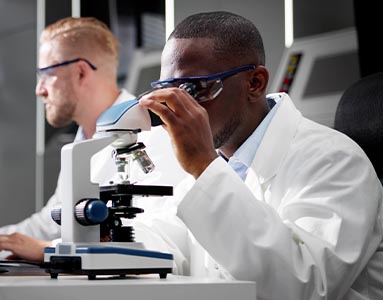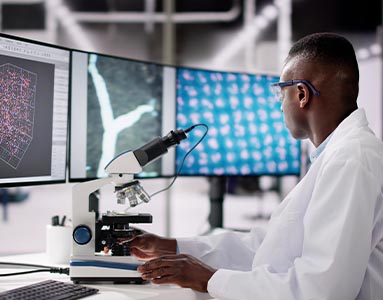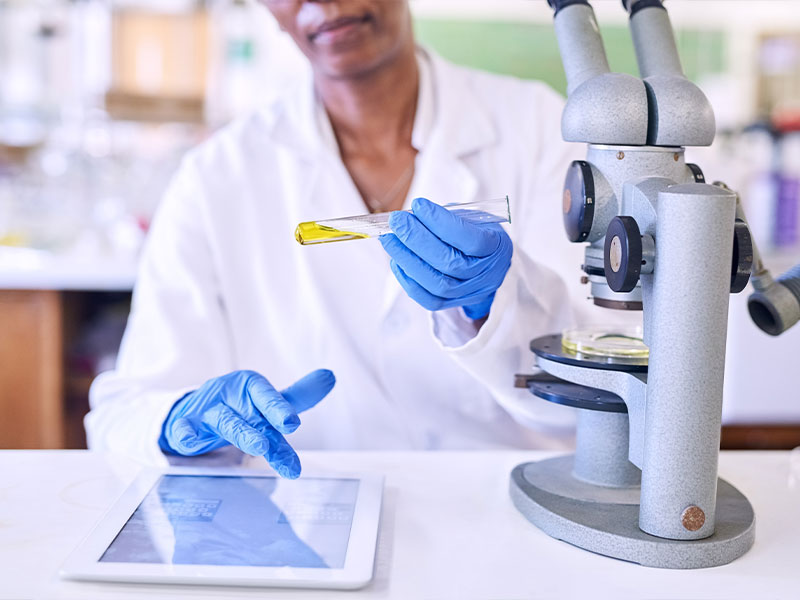Master of Science in Chemistry
The FAMU Department of Chemistry is approved by the American Chemical Society (ACS)
to offer the BS Chemistry degree with ACS certification. ACS is one of the largest
scientific organizations in the world and it is the standard for chemical education.
Our curriculum is designed to equip graduates with a thorough knowledge of the chemical
sciences. Our Student Academic and Professional Development (SAPD) series provides
a comprehensive and cumulative assessment of the curriculum with verbal reasoning
and standardized exam (MCAT, PA-CAT, DAT) preparation integrated in the four years.
We also have a MS Chemistry program that provides courses and research in the traditional
areas of chemistry-analytical chemistry, biochemistry, inorganic chemistry, organic
chemistry and physical chemistry. We also have courses and research in materials chemistry
and polymer chemistry. Some students obtain a master’s degree to prepare themselves
for immediate employment as chemists, biochemists, forensic scientists or materials
scientists while others obtain a master’s degree to prepare themselves for doctoral
work in a chemical science, and some obtain a master’s degree in preparation for professional
school like medical or dental. Our majors are equipped with the academic and professional
skills needed for success after receiving their degree, whether it be immediate employment,
graduate school or professional school.

What is Chemistry Master?
- Graduates of our MS Chemistry program can be employed as chemists, biochemists and forensic scientists.
- Chemists research and analyze the chemical properties of substances to develop new materials, products, or knowledge.
- Biochemists study the chemical and physical principles of living things and of biological processes, such as cell development, growth, heredity, and disease.
- Forensic science technicians aid criminal investigations by collecting and analyzing evidence.

Chemistry Master Careers
Chemists typically work in laboratories and offices, where they conduct experiments and analyze their results. Some chemists work in industrial manufacturing facilities. Chemists need a bachelor’s degree in chemistry. Some jobs require a master’s degree or Ph.D. and work experience.
Biochemists typically work in laboratories and offices, to conduct experiments and analyze the results. Biochemists need a Ph.D. to work in independent research positions. Bachelor’s and master’s degree holders are qualified for some entry-level positions.
Forensic science technicians often specialize in either crime scene or laboratory
analysis.
At crime scenes, forensic science technicians typically do the following:
- Analyze crime scenes to determine what evidence should be collected and how
- Take photographs and make sketches of the crime scene
- Record observations and findings, such as the location and position of evidence
- Collect evidence, including weapons, fingerprints, and bodily fluids
- Catalog and preserve evidence for transfer to crime labs
- Reconstruct crime scenes
In laboratories, forensic science technicians typically do the following:
- Perform chemical, biological, and microscopic analyses on evidence taken from crime scenes
- Examine results of DNA analyses of biological substances, such as hair and skin cells, and other evidence for their significance to investigations
- Consult with experts in specialized fields, such as toxicology (the study of poisons and their effect on the body) and odontology (a branch of forensic medicine that concentrates on teeth)
- Prepare technical reports, including statistical analyses of forensic evidence
- Operate, maintain, and clean laboratory facilities and equipment
Forensic science technicians typically need at least a bachelor’s degree to enter the occupation. Fields of study may include physical science like chemistry, biology or forensic science.

Chemistry Master Employment Expectations
- Employment of chemists is projected to grow 5 percent from 2024 to 2034, faster than the average for all occupations. About 7,000 openings for chemists and materials scientists are projected each year, on average, over the decade.
- Employment of biochemists is projected to grow 6 percent from 2024 to 2034, faster than the average for all occupations. About 2,900 openings for biochemists are projected each year, on average, over the decade.
- Employment of forensic science technicians is projected to grow 13 percent from 2024 to 2034, much faster than the average for all occupations. About 2,900 openings for forensic science technicians are projected each year, on average, over the decade.

Chemistry Frequently Asked Questions (FAQs)
Q: What is the mean salary for chemists?
A: The median annual wage for chemists was $84,150 in May 2024. The lowest 10 percent
earned less than $53,210, and the highest 10 percent earned more than $154,430.
Q: What is the mean salary for biochemists?
A: The median annual wage for biochemists was $103,650 in May 2024. The lowest 10 percent
earned less than $64,890, and the highest 10 percent earned more than $168,900.
Q: What is the mean salary for forensic scientists?
A: The median annual wage for forensic science technicians was $67,440 in May 2024. The
lowest 10 percent earned less than $45,560, and the highest 10 percent earned more
than $110,710.
Department of Chemistry Faculty
| Name | Phone | |
| Dr. Mohamed Abdel Salam Instructor |
mohamed.salam@famu.edu | |
| Dr. Natalie Arnett Associate Professor |
natalie.arnett@famu.edu | 850-412-5329 |
| Dr. James Bouyer Associate Professor/Department Chair |
james.bouyer@famu.edu | 850-599-3638 |
| Dr. Beni B. Dangi Associate Professor |
beni.dangi@famu.edu | 850-599-8419 |
| Dr. Suresh Eyunni Instructor |
suresh.eyunni@famu.edu | |
| Mr. Casanova Jackson Associate Instructor |
casanova.jackson@famu.edu | |
| Dr. Margaret Lyles Associate Instructor |
margaret.lyles@famu.edu | |
| Dr. Nelly Mateeva Professor |
nelly.mateeva@famu.edu | 850-412-5662 |
| Dr. Bereket Mochona Associate Professor |
bereket.mochona@famu.edu | 850-599-3638 |
| Dr. Musiliyu Musa Professor |
musiliyu.musa@famu.edu | 850-599-3509 |
| Dr. Edith Ndubuaku Onyeozili Professor |
edith.onyeozili@famu.edu | 850-412-5328 |
| Dr. Sanuja Pitigalaarachchige Associate Instructor |
sanuja.pitigalaarachchige@famu.edu | |
| Dr. Bishnu Regmi Associate Professor |
bishnu.regmi@famu.edu | 850-599-8424 |
| Dr. Keerthi Senevirathne Associate Professor |
keerthi.senevirathne@famu.edu | 850-599-3638 |
| Dr. Ngozi Ugochukwu Professor/Associate Dean |
ngozi.ugochukwu@famu.edu | 850-412-7124 |





